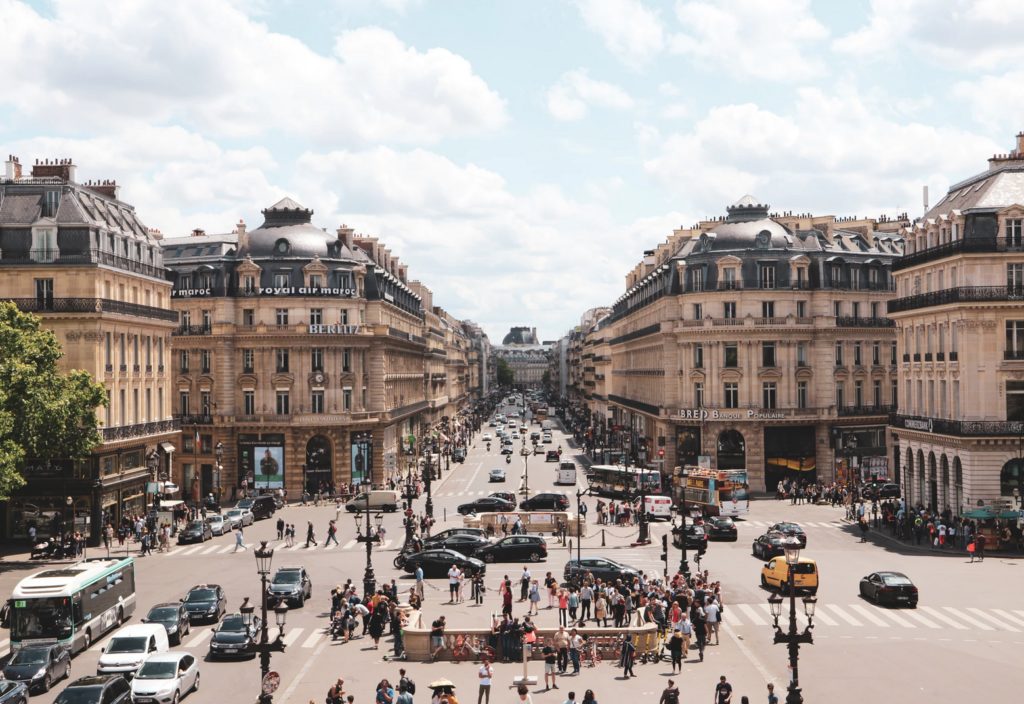Driving in Paris: What You Need to Know Before You Go
I’ll certainly be the first one to say that Paris is a city best explored on foot. That being said, sometimes having a car in the city of lights can be insanely convenient, especially if you’re planning on doing some day trips!
But on the other hand, I know firsthand that driving in Paris can be intimidating. And not to mention, super dangerous if you don’t know what you’re doing.
Don’t worry just yet. If you’re planning to drive in Paris, this guide covers all the basics and will help you out a lot!
This guide is the first in my two-part driving in Paris series. In this article, I’ll cover all the essential know before you go information, and a basic overview of driving in Paris.
So, allons-y! Below you’ll find all the information you need to drive safely and sucessfully in Paris.
Are You Legally Allowed to Drive in Paris?
In order to drive in France, and therefore Paris, you’ll need a valid driving license. The rules are a little different in France than what you may be used to, so it’s important to check the regulations carefully. For example, you cannot drive in France if you’re under 18 years old.
In my experience, the following situations are the most common:
France, Swiss and E.U. Nationals: If you hold a valid driving license issued in any of the E.U. member states, you’re free to drive in Paris, and anywhere in the E.U. This is obviously the simplest case, but be sure to double check that your insurance coverage includes France.
Non-E.U. Nationals: Anyone without a current passport from any of the E.U. member countries is considered a non-E.U. national. If you have obtained a valid driving license in your home country, you can use this in France for up to one year. Bear in mind that “valid” means that you have no restrictions, or suspensions on your license.
Students: No matter your country of origin, if you hold a student visa you are allowed to drive in Paris with a license from your home country. This agreement is valid for the duration of your residency permit, or until you change to another visa type such as work, family, etc.
International Driving Permit
No matter where you’re from, I would highly recomend getting an International Driving Permit. This is basically a small booklet with your photo and a translation of your license into several languages. While it’s not an official I.D., this little piece of documentation has proved indispensable for me in the past.
Even though many police officers and border control agents speak English, it’s always better to have an official translation to show them. An IDP is really simple and inexpensive to get, you can order one online here.
Insurance for Driving in Paris
Insurance is required for all vehicles in France (cars and motorcycles), and driving without it can seriously cost you. We’re talking license suspension and fines in the thousands of euros… Not something you want to deal with during your time in Paris.
So, how does car insurance in France work? Well, there are a few different options, depending on your personal situation.
Driving your own car in Paris:
If you have your own car, and you’re not living in France full-time, you can generally continue using the insurance from wherever your vehicle is registered.
Be sure to ask specifics from your insurance provider about foreign coverage, and France in particular. Some companies don’t insure third-party issues, and others offer additional perks like roadside assistance or services in English. So read all the information carefully. Everything offered should be outlined in your policy, and if you have any questions, don’t hesitate to ask your insurance agent.
When driving in Paris, you’ll want to have a copy of your vehicle registration, insurance policy, and an official translation of both documents. Beleive me, this will save you a ton of hassle, especially if you happen to hit a routine traffic stop.
Driving a rental car in Paris:
If you’re planning to drive a rental car in Paris, your insurance is usually provided through the rental agency. It’s really important to read through your contract and discuss your specific travel plans (going to Paris) with the rental agent. They will be able to help guide you through the process and settle on a package that works for you.
Again, it’s always a good idea to have your rental contract and insurance in the original language as well as in French. Usually, this will be provided automatically, but if not, don’t hesitate to ask. It’s free!
French Permanent Residents:
A French permanent resident is anyone who legally has the right to remain in France for one year or more. If you’ve got your own car or are leasing one in France, the process for obtaining car insurance is a little bit different.
In order to be considered fully insured in France, you must have two different peices of documentation. The first one is your attestation d’assurance which will be mailed to you whenever you sign up for an insurance contract. Secondly you’ll need a carte verte which is a small green card that comes with your insurance contract. It basically serves as a secondary proof of insurance. This little card MUST be displayed on your windshield if you’re insured in France.
Axa is one of the most popular auto insurance providers in France, and they offer their services in English, which is so helpful. Have a look at their website here. There are a lot of companies and plans to choose from, so don’t be afraid to shop around and ask questions.
Crit’Air Certificate
Now that you’ve got your driving permits and insurance straightened out, it’s time to discuss one last vehicle regulation. And yes, there’s one more piece of paperwork you’ll need for driving in Paris. But luckily, this one can easily be obtained before you arrive.
As we’ve endured some intense heatwaves in the French capital over the past several years, there’s also been a spike in pollution. In an attempt to combat these issues, the French government has introduced the Crit’Air certificate system as well as differentiated traffic patterns on the hottest/most polluted days.
What is Crit’Air?
What is Crit’Air exactly? And why do you need one of these certificates?
Well, the Crit’Air certificate is basically the rating given to a car based on it’s level of emissions. The rating system goes from 0-5 with 0 being the least emissions (electric cars, new cars) and 5 being the heaviest emissions.
Make, model and year are the biggest determinants, newer cars will fare better. The rating will be displayed on the winshield of your car, an if you’re driving a car with French plates, this is MANDATORY. If you don’t have one, and get stopped during differentiated circulation, there can be hefty fines to pay.
Don’t worry though, luckily the Crit’Air certificate is easy and inexpensive to obtain. Although they do take a few weeks to arrive in your mailbox, so if you’re planning to drive in Paris, I would recommend ordering one before you arrive. It will just make your life simpler, and save you from some potentially steep fines. You can order one online here.
If you want to read more in-depth about Crit’Air, have a look at this article, it should answer all your questions and then some.
What is differentiated circulation?
If you’re going to be driving in Paris, you should know about differentiated circulation. When air contamination levels reach a certain threshold, differentiated circulation is implemented.
This is a measure the French government has put in place to help combat high levels of pollution in metropolitan areas. When this is implemented, only vehicles with the lowest Crit’Air ratings are allowed on the roads. More police controls and random traffic checks are also common during this time.
Usually, differentiated circulation isn’t announced until the day of, or even up to the hour. Check local and national news for updates if you’re unsure. And always be on the lookout for this if you want to avoid a ticket. Since we’ve had a record-breaking summer in terms of temperatures and pollution levels, you can expect to see quite a bit of differentiated circulation in Paris.
Reminders for Driving in Paris
Alright, there you have it. Everything you need to know before you go. Driving in Paris can be an incredible experience, but it can also be a complicated one. If you follow my advice and make sure to prepare in advance, I’m confident you will have a great time.
I hope this article has been helpful to you, stay on the lookout for the second part of this series! I’ll explain the rules of the road, and the true ins and outs of driving in Paris.
As always, please don’t hesitate to contact us if you have any questions or would like further information about anything.
See you soon in Paris!
Planning a trip to Paris ? Get ready !
These are Amazon’s best-selling travel products that you may need for coming to Paris.
Bookstore
- The best travel book : Rick Steves – Paris 2023 – Learn more here
- Fodor’s Paris 2024 – Learn more here
Travel Gear
- Venture Pal Lightweight Backpack – Learn more here
- Samsonite Winfield 2 28″ Luggage – Learn more here
- Swig Savvy’s Stainless Steel Insulated Water Bottle – Learn more here
Check Amazon’s best-seller list for the most popular travel accessories. We sometimes read this list just to find out what new travel products people are buying.
















